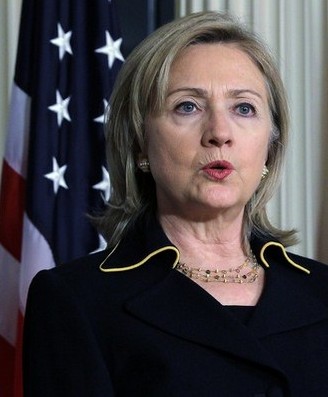Well there were plenty of pictures taken at this event today where Secretary Clinton spoke and conferred with Foreign Ministers of many Arab states as well as some European representatives. We see her here with dignitaries from Saudi Arabia, Kuwait, Bahrain, among a few, and the gentleman joking with her and making her laugh is the King of Morocco.
According to this press release from the State Department, she will deliver a speech at the forum tomorrow.
Secretary Clinton To Deliver Speech at the Forum for the Future on Tuesday November 3, 2009
Office of the Spokesman
Washington, DC
November 2, 2009
Secretary Clinton will deliver remarks at the opening session of the Forum for the Future in Marrakech, Morocco at 4:00 am ET / 9:00 am LOCAL tomorrow, Tuesday, November 3, 2009. Video of the Secretary's remarks will be available shortly after the speech concludes.
The Forum for the Future is a joint civil society initiative of the countries of the Broader Middle East and North Africa region (BMENA) and the Group of Eight (G8). It brings together leaders from government, civil society and the private sector to exchange ideas and form partnerships to support progress, reform, and expanded opportunities for the people of the region.
The Secretary’s speech will reaffirm the commitment of the United States to broad engagement with Muslim communities around the world and outline concrete steps the United States is taking to follow up on the “New Beginning” that President Obama launched in Cairo

Despite the fact that all looks rosy in these photos, the Secretary has drawn some serious fire from Arab leaders due to statements she made in Jerusalem over the weekend. Many negative reviews poured forth yesterday, and I will not link the many I saw, but here are a few examples:
From the Jerusalem Post:
PA to US: Coerce settlement freezeFrom Firedoglake:
Somewhere, Khaled Meshal Is LaughingFrom the BBC:
Obama yet to deliver on Middle East
Finally, today there were these.
From Foreign Policy Magazine:
From Washington and Jerusalem: more bad newsFrom People's Daily Online:
Egypt supports Palestinian demand for settlement freezeThe Secretary released the following clarifications today which, I believe were stated at the Forum since I just saw her on PBS saying some of what is in the text:
Secretary Clinton on the Middle East
Hillary Rodham Clinton
Secretary of State
Marrakech, Morocco
November 2, 2009
Secretary Clinton delivered the following remarks Monday morning at a camera spray upon meeting with Moroccan Foreign Minister Fassi-Fihri in Marrakech, Morocco:
For 40 years, successive American administrations of both parties have opposed Israel’s settlement policy. That is absolutely a fact.
And the Obama Administration’s position on settlements is clear, unequivocal. It has not changed. And as the President has said on many occasions, the United States does not accept the legitimacy of continued Israeli settlements. Now, the Israelis have responded to the call from the United States, the Palestinians and the Arab world to stop settlement activity by expressing a willingness to restrain settlement activity. They will build no new settlements, expropriate no land, allow no new construction or approvals.
And let me just say this offer falls far short of what we would characterize as our position, or what our preference would be. But if it is acted upon, it will be an unprecedented restriction on settlements and would have a significant and meaningful effect on restraining their growth.
Let me take a step back because I want to put this into the broader context. I will offer positive reinforcement to the parties when I believe they are taking steps that support the objective of reaching a two-state solution.
I will also push them as I have in public and in private to do even more. And in my report to the President last month, I talked about Israeli willingness to restrain settlement activity as a positive step.
In the same report, I praised President Abbas’ leadership of the Palestinian Authority for their courage and the security measures on the West Bank. The steps being taken under President Abbas and Prime Minister Fayed are also unprecedented and we have never seen such effective security. I have on many occasions going back – as you know in Sharm El Sheikh - praised the accomplishments that the Palestinian Authority has demonstrated in building, training, and reforming their security forces.
I told Prime Minister Netanyahu that these positive steps on the part of the Palestinians should be met by positive steps from Israel - movement and access, operations by the IDF and on Israeli security arrangements on the West Bank. Israel has done a few things in that regard but they need to do much more. And President Abbas has shown leadership and determination on this issue and Israel should reciprocate.
I just want to clarify that what we are trying to achieve is a two-state solution with a state that represents the aspirations of the Palestinian people – the sovereignty and to have control over their own future, and provide the security guarantees to Israel for their own future. That is my goal. And when either party takes any steps that looks like it moves us in the right direction – even if it is not what I would like or what I would prefer - I’m going to positively reinforce that.
This is an opportunity for both sides to try to move forward together, to get into negotiations, and to realize the goal that many of us around this table have supported and worked for for many years.
She was scheduled to return to D.C. on Wednesday, but Gwen Ifill just announced on the PBS
Newshour with Jim Lehrer that her trip has been extended one day in order for her to go to Egypt and meet with President Mubarak. This Reuters story,
Clinton to fly to Egypt for Mubarak meeting appears to corroborate that report.





